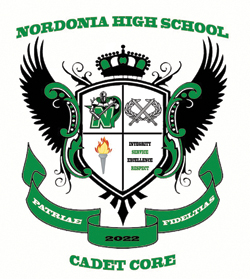Sports officiating, military prep added to NHS curriculum
by Laura Bednar
The physical education-health department at Nordonia High School is offering two new courses for students this year: sports officiating and cadet core.
The school has tried to create new electives following the district’s decision to waive physical education for students who complete two seasons of a sport, band or cheerleading. This alternative replaces the state’s required two semesters of P.E.
“We needed to have enough classes to keep kids in the gym,” said physical education teacher and department head Amie Cormell.
The electives don’t replace the P.E. requirement, but Cormell said they give students “a break from the classroom,” especially upperclassmen who already took P.E.
Sports officiating was created as a response to the nationwide officiating shortage, according to Nordonia Athletic Director Rob Eckenrode.
“COVID did a number on officials,” he said, adding that he has seen the shortage grow over his 23 years as an athletic director.
While attending a conference, Eckenrode learned his alma mater, Jackson High School in Stark County, had started an officiating class. He brought the idea to Cormell, who spoke to Jackson High and Ohio High School Athletic Association officials. In partnership with the OHSAA, the course will be offered to all NHS students and focus on the rules, mechanics and fundamentals of basketball, baseball and softball.
Cormell will teach the course using the online program RefReps, a virtual simulation that offers real-world in-game scenarios for students to experience. Before using RefReps, students will learn the rules and mechanics behind a sport in RefPrep, a program developed by officials and educators to “bring learners of all experience levels the material needed to master the rules of the game and become a sports official,” according to refreps.com.
In addition to the online component, Cormell will provide hands-on activities and guest speakers. “I’m excited to have guest referees and umpires come in,” she said, adding that she hopes students can also learn to have empathy for officials who deal with unruly fans and coaches.
The first quarter will cover baseball and softball, and the second quarter will focus on basketball. Students who feel comfortable officiating youth sports will have the opportunity to referee Nordonia Youth Basketball games and umpire in the Nordonia Hills Athletic Association youth baseball/softball program.
Cormell said youth recreation leagues pay officials around $10 per hour and no age restrictions or certifications are required. OHSAA payment per game depends on the sport and whether its junior varsity or varsity. Students must be at least 16 years old and pass a test to become OHSAA certified. Once certified, students start with middle school games and can work their way up to high school.
“For many students, their athletic career ends after they leave high school,” said Eckenrode. “This gives them the opportunity to continue with the sport they loved.”
Students can take the course every year with the curriculum progressing; students are required to officiate a certain number of games to take higher-level courses. “Students can take officiating as far as they want to and make money doing it,” Cormell said.
Nordonia hasn’t canceled games due to a lack of officials, but Eckenrode said it gets harder every year and he hopes the course helps replenish the pool of available officials.
Cadet core was created because many NHS students pursue a military career out of high school, according to Cormell. It is similar to a pre-ROTC program and prepares students mentally and physically for the military.
A typical week includes one day wearing a provided uniform, practicing drill and presenting colors. Cormell said the goal is for core members to present the colors at parades, before the National Anthem at sporting events and during patriotic holidays.
Two days are dedicated to physical training like push-ups, sit-ups and running. The other two days, students are in the classroom learning patriotism, history of the military, command structure and how the military works in the government.
Cormell said students will learn “leadership, discipline and responsibility.”
Each student is assigned a military recruiter for guidance and to determine if they qualify for military service when ready.
The course is open to all NHS students and can be taken multiple times, with each year becoming more rigorous. There is no requirement to join the military upon completion. “If anyone is thinking about the military, this will help them decide if they do or don’t want to join,” Cormell said.
Other school districts have reduced staff in physical education departments and do not offer electives, according to Cormell. “NHS has offered more opportunities,” she said. “We emphasize a connection to the community and these two courses are perfect for that.” ∞

